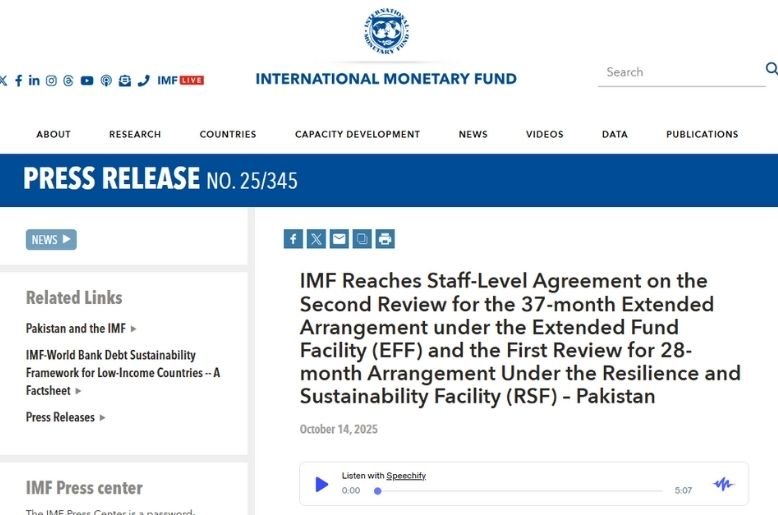The International Monetary Fund (IMF) and Pakistan have reached a staff level agreement on the second review of the 37-month Extended Fund Facility (EFF) and the first review of the 28-month Resilience and Sustainability Facility (RSF), paving the way for a potential disbursement of around US$1.2 billion, subject to approval by the IMF Executive Board.
Pakistan’s Program Shows Strong Implementation
According to an official IMF statement issued on October 15, the agreement was reached after discussions between IMF staff and Pakistani authorities during a mission from September 24 to October 8 in Karachi, Islamabad, and Washington, DC
The IMF mission, led by Iva Petrova, confirmed that “implementation of the EFF-supported program remains strong,” with Pakistan showing commitment to “sustaining the fiscal effort to strengthen public finances while providing needed support to the victims of the recent floods.”
Petrova noted that Pakistan’s economic recovery “remains on track,” citing that “the FY25 current account recorded a surplus, the first in 14 years,” and that “the fiscal primary balance surpassed the program target.”
She added that “inflation remains contained, external buffers are strengthening, and financial conditions are improving as sovereign spreads have narrowed significantly.”
Addressing Challenges After Devastating Floods
The IMF acknowledged that recent floods have severely impacted Pakistan, “affecting nearly 7 million people” and “bringing down the projected FY26 GDP to about 3¼–3½ percent.”
The statement emphasised that the disaster “underscores Pakistan’s high vulnerability to natural disasters and substantial climate-related risks.”
In response, the IMF said Pakistan is prioritizing “fiscal consolidation,” aiming for a “budget primary surplus of 1.6 percent of GDP,” while reallocating resources to provide “urgent flood relief support in the affected provinces.”
The government also reaffirmed its focus on “strengthening poverty reduction and social protection,” including enhancing the Benazir Income Support Program (BISP) and scaling up spending in health and education.
Reform Commitments and Climate Resilience
The IMF highlighted Pakistan’s progress on “advancing structural reforms” to “enhance revenue mobilization,” strengthen public financial management, and “restore the viability of the energy sector” through “timely tariff adjustments that ensure cost recovery.”
Petrova commended Pakistan’s efforts to maintain “a prudent monetary policy stance” to keep inflation “within the target range of 5–7 percent.”
The RSF-supported reforms were also praised for “promoting green mobility, transport de-carbonisation, and improving water system resilience.”
Concluding the statement, Petrova said, “The IMF team wants to express its sympathy to those affected by the recent floods and is grateful to the Pakistani authorities, private sector, and development partners for many fruitful discussions and their hospitality throughout this mission.”




